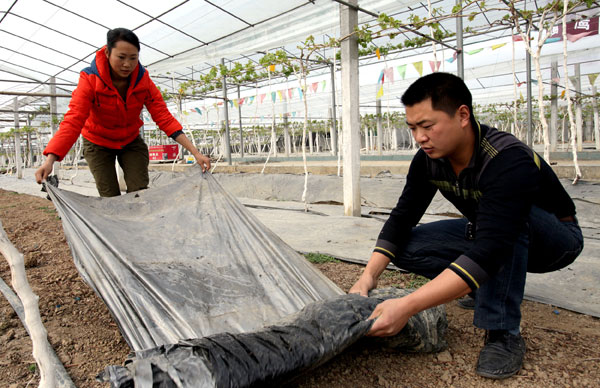Family farms plant seeds for prosperity
Updated: 2013-04-01 07:48
By Xie Yu (China Daily)
|
||||||||
More than 6,670 family farms are operating in 33 pilot land-transfer projects approved by the Ministry of Agriculture, according to Xinhua News Agency.
For example, around 80 percent of the 9,100 hectares of arable land in Songjiang is operated by about 2,000 family farms.
Rising incomes
Sun Hongrong is the youngest owner of a family farm, in Songjiang's Tongjian village. Although his father worked on the land, Sun had no direct experience of farming until he was 35. Having earlier followed his father's advice and attended college, he later worked in a city and severed all connections with cultivation and raising livestock.
But now, the 39 year old is a fulltime farmer. He earned around 300,000 yuan last year, growing rice and raising chickens and ducks on his nine-hectare farm. The sum is several times higher than his annual salary at his previous job.
Meanwhile, Jiang Yongqiu, 58, an experienced tractor driver and rice farmer, said he earned more than 80,000 yuan by planting rice on his family farm last year. The sum was something he had "dared not imagine before", having earned a minimal wage for most of his life.
"I drove tractors for more than 30 years before running this farm. I remember that for a very long time the pay was just two yuan a day. I also had a small patch of land on which I could grow a little rice to feed the family, but that was my total income," he said.
Jiang has been renting land from the 40 families in his village since 2007. The rent is 10,500 yuan per hectare, but he receives 9,150 yuan per hectare in subsidies, paid to encourage the growth of family farms. "The cost of the land is almost totally covered by the government," he said.
However, when the pilot scheme began, few people were willing to join, largely because of concerns about the relatively large input required for farmland of more than seven hectares and concerns about the stability of the government's subsidy policy, said Xu.
"But too many people are applying to join the program these days and we have to create a higher threshold to select qualified operators," she said, adding that young or middle-aged country dwellers with agricultural experience are the preferred applicants.
Just as the nation introduced the household contract responsibility system in rural areas in the early 1980s, the family farm model could develop and reshape China's agricultural sector at a time when huge numbers of rural residents are leaving the land, seeking higher wages and better social welfare in the cities.
The introduction of the household contract responsibility system enabled farmers to use the land through long-term contracts and to keep their produce after paying taxes. Before that, each farmer was confined to a small patch of land, which made the use of machinery problematic.
- Farmers become migrant workers to boost pensions
- Farmers grow organic watermelons to order
- Pig farmer deputy keeps one eye on life at home
- Farmer pays tax tribute to Wen
- China stresses farmers' property rights in land transfers
- How to feed China as farmers move to cities
- Strong voice of the farmers
- Farmers need patience for improved legislation
- Cooperative sows seeds of hope for farmers
- Liaoning care centers benefit farmers

 Li Na on Time cover, makes influential 100 list
Li Na on Time cover, makes influential 100 list
 FBI releases photos of 2 Boston bombings suspects
FBI releases photos of 2 Boston bombings suspects
 World's wackiest hairstyles
World's wackiest hairstyles
 Sandstorms strike Northwest China
Sandstorms strike Northwest China
 Never-seen photos of Madonna on display
Never-seen photos of Madonna on display
 H7N9 outbreak linked to waterfowl migration
H7N9 outbreak linked to waterfowl migration
 Dozens feared dead in Texas plant blast
Dozens feared dead in Texas plant blast
 Venezuelan court rules out manual votes counting
Venezuelan court rules out manual votes counting
Most Viewed
Editor's Picks

|

|

|

|

|

|
Today's Top News
Boston bombing suspect reported cornered on boat
7.0-magnitude quake hits Sichuan
Cross-talk artist helps to spread the word
'Green' awareness levels drop in Beijing
Palace Museum spruces up
First couple on Time's list of most influential
H7N9 flu transmission studied
Trading channels 'need to broaden'
US Weekly

|

|









